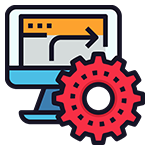Who QA automation Engineer is
 A QA Automation Engineer, also known as a Test Automation Engineer, is a software professional responsible for designing, developing, and implementing automated test scripts and frameworks to facilitate the testing process. QA Automation Engineers use specialized tools and programming languages to automate repetitive and manual testing tasks, enabling faster and more efficient testing of software applications and systems.
QA Automation Engineers play a critical role in the software development lifecycle by accelerating testing cycles, improving test accuracy, and reducing manual efforts. Their expertise in test automation tools and programming languages allows them to focus on more challenging aspects of testing, enabling faster feedback and higher overall software quality. Additionally, automation helps ensure that testing remains consistent across releases and helps uncover defects early in the development process, contributing to efficient and reliable software delivery.
A QA Automation Engineer, also known as a Test Automation Engineer, is a software professional responsible for designing, developing, and implementing automated test scripts and frameworks to facilitate the testing process. QA Automation Engineers use specialized tools and programming languages to automate repetitive and manual testing tasks, enabling faster and more efficient testing of software applications and systems.
QA Automation Engineers play a critical role in the software development lifecycle by accelerating testing cycles, improving test accuracy, and reducing manual efforts. Their expertise in test automation tools and programming languages allows them to focus on more challenging aspects of testing, enabling faster feedback and higher overall software quality. Additionally, automation helps ensure that testing remains consistent across releases and helps uncover defects early in the development process, contributing to efficient and reliable software delivery. In which areas is QA automation Engineer most beneficial?
QA Automation Engineers are most beneficial in the following areas:
- Test Efficiency: QA Automation Engineers significantly improve the efficiency of software testing by automating repetitive and time-consuming test cases, allowing more comprehensive testing in less time.
- Regression Testing: Automation is particularly valuable for regression testing, ensuring that existing functionalities continue to work correctly after new code changes.
- Continuous Integration and Deployment (CI/CD): QA Automation Engineers integrate automated tests into the CI/CD pipeline, allowing for continuous and frequent testing throughout the development process.
- Cross-Browser and Cross-Platform Testing: Automation facilitates testing across multiple browsers and platforms, ensuring consistent performance and user experience.
- Performance Testing: QA Automation Engineers automate performance testing to assess software response times, load handling, and scalability under various conditions.
- Load and Stress Testing: Automation helps conduct load and stress testing to analyze software performance under heavy user loads.
- Large-Scale Projects: Automation is particularly beneficial for large-scale projects with extensive testing requirements, where manual testing would be time-consuming and prone to errors.
- Complex Test Scenarios: QA Automation Engineers can handle complex test scenarios that involve multiple test cases and data variations more effectively through automation.
- Test Data Management: Automation allows for efficient test data generation, manipulation, and management, ensuring data accuracy and consistency during testing.
- Test Reporting and Analysis: Automation provides detailed test reports and metrics that help identify trends, track defects, and make informed decisions.
- Scalability and Reusability: QA Automation Engineers design automation frameworks that are scalable and reusable, reducing maintenance efforts and increasing overall testing efficiency.
- Integration Testing: Automation enables smooth integration testing by automating interactions between different components or systems.
